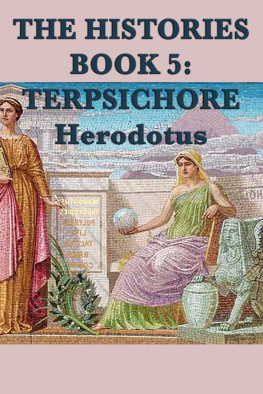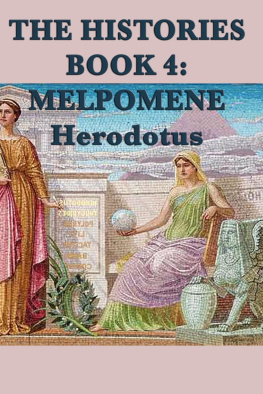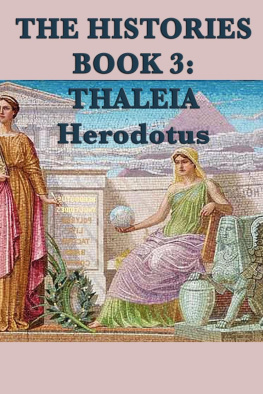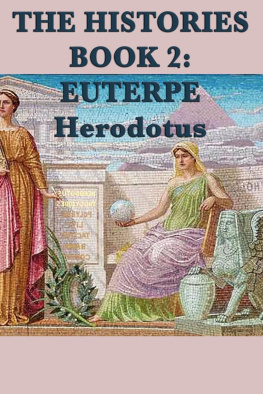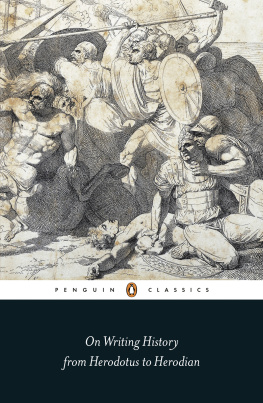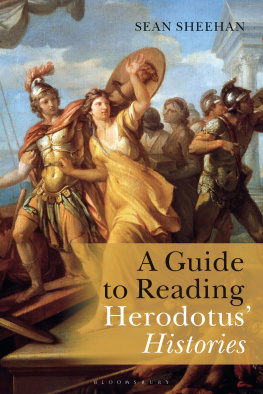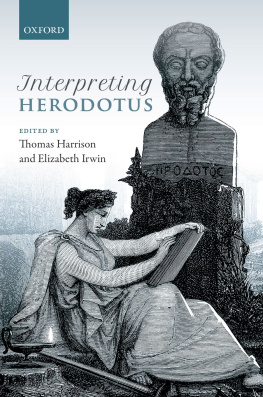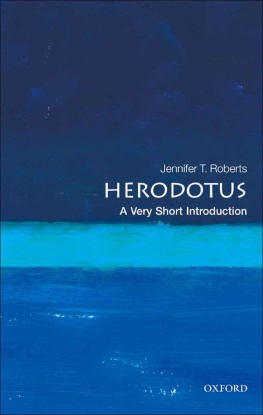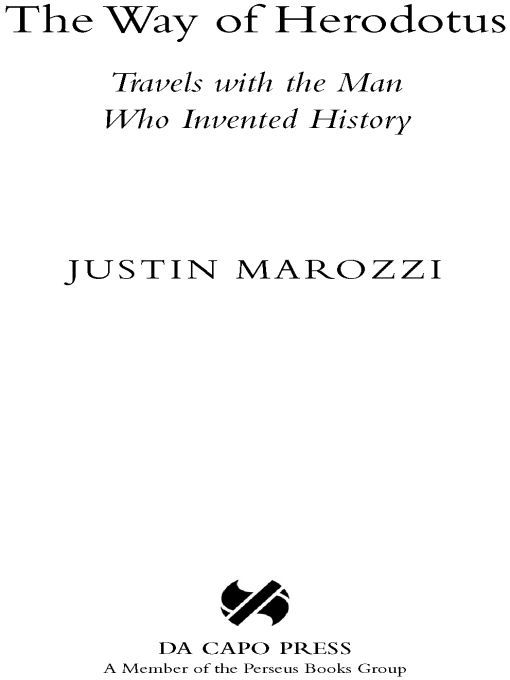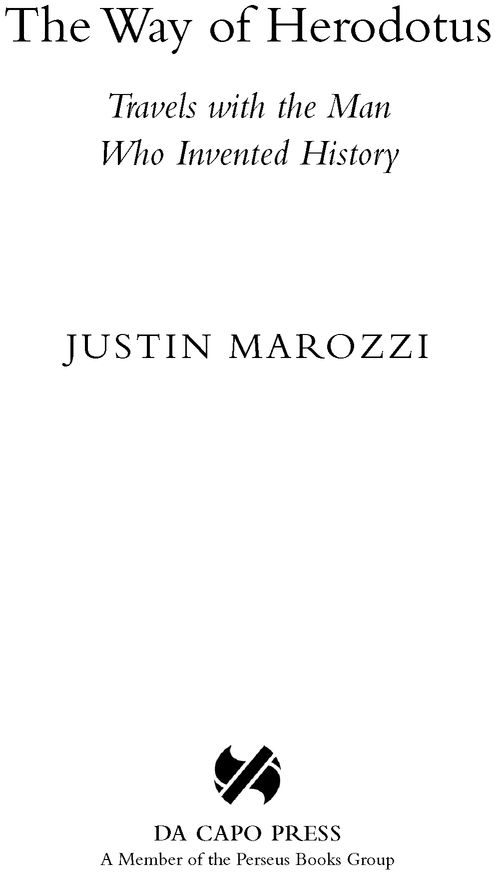Table of Contents
Also by Justin Marozzi
South from Barbary
Tamerlane
Once again to Julia
The appeal of history to us all is in the last analysis poetic. But the poetry of history does not consist of imagination roaming at large, but of imagination pursuing the fact and fastening upon it. That which compels the historian to scorn delights and live laborious days is the ardour of his own curiosity to know what really happened long ago in that land of mystery which we call the past. To peer into that magic mirror and see fresh figures there every day is a burning desire that consumes and satisfies him all his life, that carries him each morning, eager as a lover, to the library and muniment room. It haunts him like a passion of terrible potency, because it is poetic. The dead were and are not. Their place knows them no more, and is ours today. Yet they were once as real as we, and we shall tomorrow be shadows like them...
G. M. Trevelyan, Autobiography and Other Essays
I need not apologise for the digression. It has been my habit throughout this work.
Herodotus, Histories
Reader, I think proper, before we proceed any farther together,
to acquaint thee, that I intend to digress, through this whole
History, as often as I see Occasion.
Henry Fielding, Tom Jones
Acknowledgements
A JOURNEY WITH HERODOTUS is the work - and pleasure - of a lifetime. I have had the great fortune to be accompanied every step of the way by Paul Cartledge, Professor of Greek History at Cambridge University, to whom I offer my greatest thanks. Although Herodotus died almost 2,500 years ago, he remains capable of inspiring lasting friendships, a wonderful posthumous tribute to his breadth of vision and generosity of spirit. I count myself lucky to have met Paul and so to have benefited undeservedly from his font of Herodotean wisdom.
Thank you to my friend Tom Sutherland, who first put me on the trail of Herodotus, and to Dr Angus Bowie, Lobel Praelector in Classics at Oxford University, for providing an initial steer in the dense and often impenetrable world of Herodotean studies.
Travels with Herodotus can take you anywhere. He is as relevant to ancient Egypt as to contemporary Washington. I concentrated on Turkey, Iraq, Egypt and Greece, an ambitious itinerary made possible in large part thanks to the enlightened support of Rahul Jacob, the incomparable travel editor of the Financial Times, who consistently said yes when others would have said no.
The Herodotus who kept me company during my journeys, and from whom I quote most often, can be found in the highly accessible - and portable - Penguin Classics edition of the Histories.
In Turkey, I enjoyed the water-borne hospitality of Gurkan Kinaci in Bodrum, onetime Halicarnassus, Herodotus hometown. Thanks to Meltem Ozer, Mazlum Aan, the towns mayor, Ouz Alpzen, director of the Bodrum Museum of Underwater Archaeology, Tufan Turanli and Dr George Bass of the Institute of Nautical Archaeology, and anan Kkeren, historian and irrepressible Herodotus devotee.
In Iraq, I am grateful first of all to Lieutenant-Colonel Tim Spicer OBE for giving me the opportunity to live and work in Baghdad for more than a year and take Herodotus to war. Thank you to His Excellency Samir Sumaidaie, Iraqs ambassador to Washington, National Security Adviser Mowaffak Rubaie, Defence Minister Saadoun Dulaimi, Brigadier James Ellery CBE, Dr Thair Ali and Catriona Laing for their friendship, support and humour in challenging times and to Dr Donny George, director of the National Museum in Baghdad, for a private tour of one of the worlds greatest collections of antiquities. Dr Abdul Aziz Hamid, chairman of the State Board of Antiquities, enabled us to make a small donation to preserving the house in Baghdad that houses the museums archives. The Polish archaeologist Agnieszka Dolatowska gave a memorable guided tour of Babylon during its catastrophic occupation by Coalition forces. Joan Porter MacIver and Dr Lamia al Gailani of the British School of Archaeology in Iraq and Professor Amlie Kuhrt FBA of University College, London, kindly assisted with later research. Thank you to all those unnamed colleagues who kept me out of harms way.
In Egypt, my thanks to Philip Hamilton-Grierson and Mark Stacey of Cox & Kings for arranging a long Herodotean itinerary so masterfully. My friend Mandi Mourad was an inspired and indefatigable guide to getting hold of all the right people in Cairo. Herodotus has a good deal to teach the modern world about interfaith relations. In this regard, I enjoyed revealing conversations with Ali Gomaa, the Grand Mufti of Egypt, Mouneer Anis, the Anglican Bishop of Egypt, and Dr Ali al Semman of the Supreme Council for Islamic Affairs. Thanks also to Gamila Ismail, wife of the jailed opposition leader Ayman Nur, the human rights lawyer Amir Salem, Leila Soueif, Professor Assem Deif, for sharing his understanding of pyramidal mathematics, Heba Saleh of the BBC, the novelists Alaa al Aswany and Bahaa Taher, Max Rodenbeck, Salima Ikram, professor of Egyptology at the American University in Cairo, the Luxor Museum of Mummification for helping me test Herodotus reliability in the crusty world of embalming, Ehab Gaddis, Dr Nasry Iskander, director general of Conservation and Preservation in the Egyptian Antiquities Organisation, generally regarded as the Daddy of Mummies at the Egyptian Museum, Abd al Monem Abu al Futuh of the Muslim Brotherhood, Hani Shukrallah, director of the Heikal Foundation, the democracy activist Saad Eddin Ibrahim, chairman of the Ibn Khaldun Centre for Democracy Studies, the prolific blogger Issandr al Amrani, the activist Bothaina Kamel, the actor Khaled Abul Naga and Rabab Abdelaziz Othman, who can dance with a blazing candelabrum on her head. Herodotus would have been thrilled, as I was, to listen to the controversial film director Inas al Deghedy and Hind al Hinnawy, the countrys most famous and infamous single mother, breaking taboos and lifting the lid on Egypts sexual mores. In the oasis of Siwa my research into illicit homosexuality, among other things, was assisted by the anthropologist Fathi Malim and the tribal leaders Sheikhs Fathi Kilane and Omar Rageh and Mohammed Abd al Wahab Tayeb Mosallim. In Aswan, thanks to Esmat Abd al Malak, director of the Elephantine Museum, and Mohammed Talat Abdul Aziz, chairman of the High Dam and Aswan Dams Authority, for explaining the mysterious workings of the Nile. Good guides in Egypt were as indispensable to me as they were to Herodotus. Thank you to Abd al Sattar in Aswan, Refaat al Hakim in Luxor, Atef in Siwa and Galal Moawad in Cairo.
In Greece, thank you to Rachel Howard for setting the ball rolling and pointing me towards so many helpfully Herodotean people in Athens,beginning with Cleopatra van de Winkel,Vassilis Papadimitriou, his wife Sofka Zinovieff and colleague Anna Bakola, who all displayed humbling hospitality and kindness. Thank you to former prime minister Tzannis Tzannetakis, to Irene Noel-Baker and Garth Fowden for providing the perfect start to a journey in Greece in the form of a classically Herodotean conference in Athens, at which I had the good fortune to meet Professor Vassos Karageorghis of the University of Cyprus and Dr Miltiades Hatzopoulos, director of the Institute of Greek and Roman Antiquity at the National Hellenic Research Foundation. Thank you to Amalia Zepou for pointing the way to groundbreaking history in Thessaloniki, where I am indebted to Nenad Sebek of the Centre for Democracy and Reconciliation in South-east Europe. On the open seas to Samos Captain Vassilis Theodore was a generous guide to Greek seafaring.


